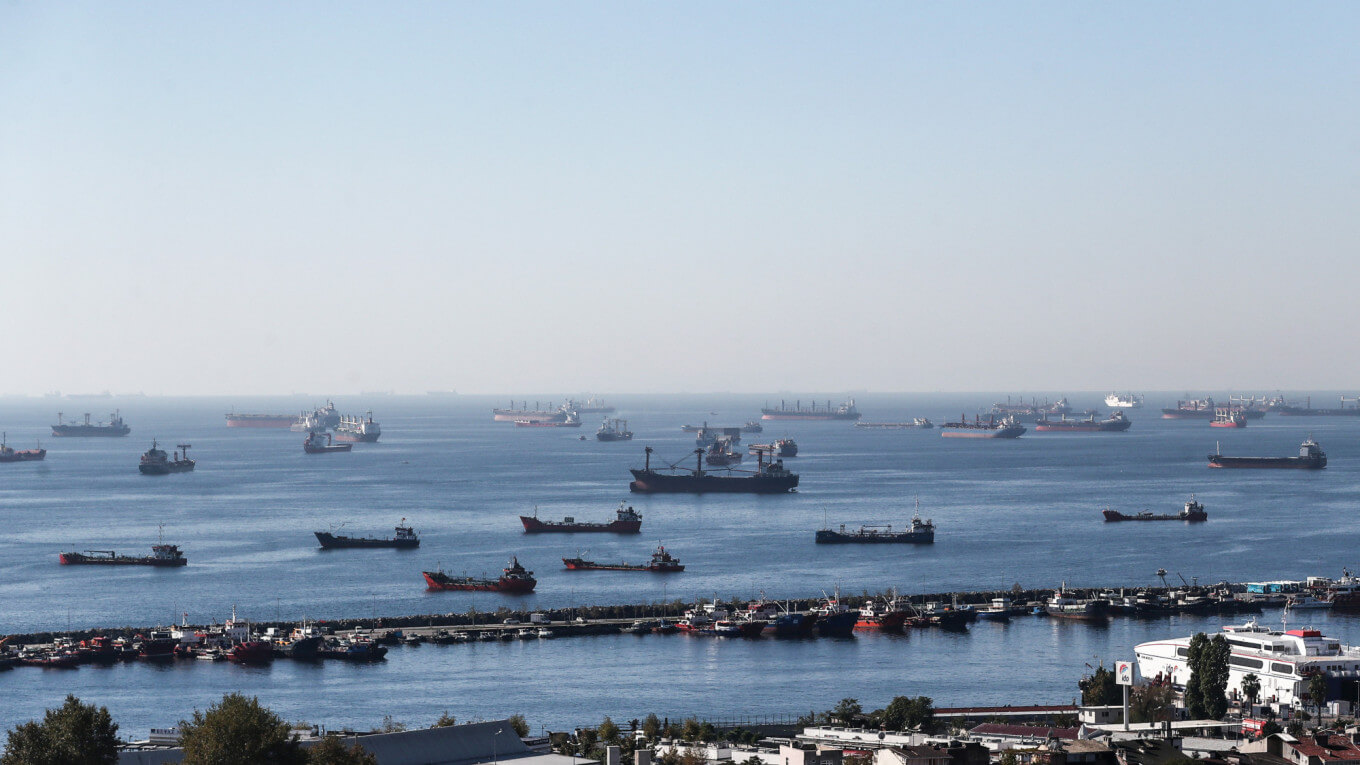On Saturday, Russia suspended the Black Sea Grain Initiative brokered by Turkey and the United Nations (UN) for “an indefinite period” following a drone strike on its Black Sea Fleet’s ships in Sevastopol. Ukraine has denounced Russia’s move as “rather predictable.”
In a statement, the Russian Defence Ministry accused Ukraine of using nine unmanned aerial vehicles (UAVs) and seven sea drones to strike three Russian ships, including Admiral Makarov. It said that Russian forces had managed to destroy most of the drones, though it admitted to “minor damage” to a minesweeper called Ivan Golublets. While it did not say whether Admiral Makarov was severely damaged, reports indicate that its hull was breached and its radar systems destroyed.
Unbelievable footage from one of the marine drones used in the attack on Russia’s Black Sea Fleet in Sevastopol.
— James Waterhouse (@JamWaterhouse) October 29, 2022
(Via Ukrainian journalist Andriy Tsaplienko)
Full story: https://t.co/YdtcFELiSy pic.twitter.com/Nw5YbHeQMU
It went on to say that the attacks “were carried out under supervision of British specialists in the city of Ochakov, Nikolayev region in Ukraine.” After analysing the drones’ wreckage on Sunday, the ministry said the UAVs had Canadian navigation modules, and that the sea drones were launched from Odesa.
However, the British Ministry of Defence strongly dismissed the allegations by saying, “To detract from their disastrous handling of the illegal invasion of Ukraine, the Russian Ministry of Defence is resorting to peddling false claims of an epic scale. This invented story, says more about arguments going on inside the Russian government than it does about the west.”
Russia has made a counter-offer to expand grain exports after the Black Sea grain export deal collapsed
— Samuel Ramani (@SamRamani2) October 30, 2022
Russia could force Global South countries to accept purchases of stolen Ukrainian grain
Russian-installed Governor of Sevastopol Mikhail Razvozhayev called the drone attack one of the “most massive” ones.
On Sunday, Ukraine’s Infrastructure Ministry revealed that 218 ships had been blocked—22 loaded and stuck at ports, 95 loaded and at sea, and 101 awaiting inspection. Ukrainian Minister of Infrastructure Oleksandr Kubrakov noted that one of the blocked ships, Ikaria Angel, is stuck in the Black Sea port of Chornomorsk carrying 40,000 tonnes of wheat for Ethiopia under the UN’s World Food Programme.
FM @DmytroKuleba: “#Ukraine remains fully committed to the Black Sea Grain Initiative. We want it to keep functioning and expand. I call on the international community to demand that #Russia immediately stops artificial delays in the inspections of the grain corridor vessels.” pic.twitter.com/f4LLQUxuiF
— MFA of Ukraine 🇺🇦 (@MFA_Ukraine) October 26, 2022
Ukrainian President Volodymyr Zelensky called Russia’s decision “absolutely deliberate,” saying it will affect seven million consumers, with about two million tonnes of grain stuck at sea. “This is an absolutely transparent intention of Russia to return the threat of large-scale famine to Africa and Asia,” he stated, calling on the Group of 20 (G20) to take strong action against Russia.
United States (US) President Joe Biden, too, described it as “really outrageous,” saying it would only increase starvation. In a similar vein, US Secretary of State Antony Blinken accused Russia of “weaponising food,” arguing that it would directly impact low- and middle-income countries and global food prices, and further aggravate “already dire humanitarian crises and food insecurity.”
The Black Sea Grain Initiative has brought more than 9 million metric tons of food from Ukraine and lowered global food prices. We urge all parties to uphold this tremendously successful Initiative.
— Secretary Antony Blinken (@SecBlinken) October 30, 2022
Russian Ambassador to the US Anatoly Antonov slammed the US’ reaction to the Sevastopol attack as “outrageous.” “We have not seen any signs of condemnation of the reckless actions by the Kyiv regime,” he asserted.
Meanwhile, Turkish Defence Minister Hulusi Akar revealed that he has been in touch with his Ukrainian and Russian counterparts, Oleksi Reznikov and Sergei Shoigu, to “solve the problem and to continue the grain initiative.” Likewise, UN Secretary-General António Guterres delayed his travel to an Arab League summit in order to enter into “intense negotiations” with all parties involved.
In this regard, the UN and Turkey announced a transit plan for 16 ships on Monday irrespective of Russia not being involved. Over 9.5 million tonnes of corn, wheat, sunflower products, barley, rapeseed and soy have been exported since July after the UN and Turkey-brokered Black Sea Grain Initiative was signed.

